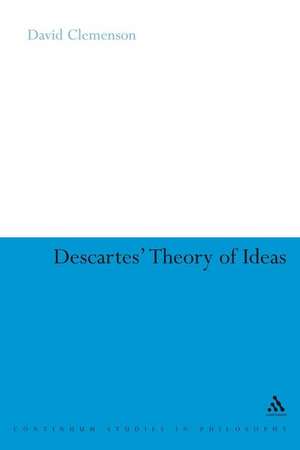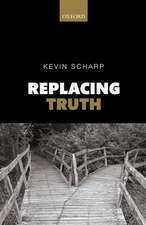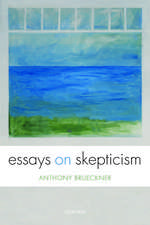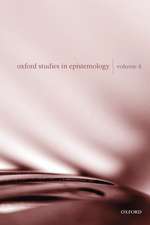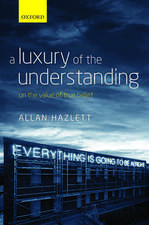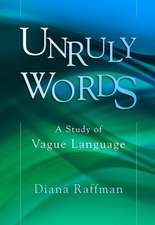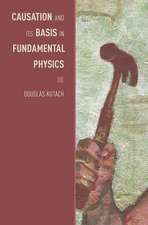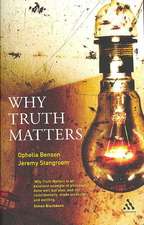Descartes' Theory of Ideas: Continuum Studies in Philosophy
Autor David Clemensonen Limba Engleză Hardback – 2 mai 2007
Din seria Continuum Studies in Philosophy
-
 Preț: 255.58 lei
Preț: 255.58 lei -
 Preț: 256.59 lei
Preț: 256.59 lei - 22%
 Preț: 256.29 lei
Preț: 256.29 lei - 31%
 Preț: 890.62 lei
Preț: 890.62 lei - 18%
 Preț: 304.66 lei
Preț: 304.66 lei -
 Preț: 254.93 lei
Preț: 254.93 lei - 24%
 Preț: 249.00 lei
Preț: 249.00 lei - 22%
 Preț: 889.49 lei
Preț: 889.49 lei - 31%
 Preț: 890.86 lei
Preț: 890.86 lei - 22%
 Preț: 1064.84 lei
Preț: 1064.84 lei - 31%
 Preț: 947.54 lei
Preț: 947.54 lei - 23%
 Preț: 255.11 lei
Preț: 255.11 lei - 31%
 Preț: 890.72 lei
Preț: 890.72 lei - 22%
 Preț: 1005.49 lei
Preț: 1005.49 lei - 22%
 Preț: 946.72 lei
Preț: 946.72 lei -
 Preț: 254.75 lei
Preț: 254.75 lei - 22%
 Preț: 1005.98 lei
Preț: 1005.98 lei -
 Preț: 255.19 lei
Preț: 255.19 lei - 31%
 Preț: 889.15 lei
Preț: 889.15 lei - 31%
 Preț: 1006.06 lei
Preț: 1006.06 lei - 22%
 Preț: 889.23 lei
Preț: 889.23 lei - 22%
 Preț: 947.86 lei
Preț: 947.86 lei - 22%
 Preț: 256.49 lei
Preț: 256.49 lei - 31%
 Preț: 888.58 lei
Preț: 888.58 lei - 14%
 Preț: 1006.24 lei
Preț: 1006.24 lei - 31%
 Preț: 891.51 lei
Preț: 891.51 lei - 22%
 Preț: 1005.89 lei
Preț: 1005.89 lei -
 Preț: 256.38 lei
Preț: 256.38 lei - 31%
 Preț: 1152.60 lei
Preț: 1152.60 lei - 23%
 Preț: 255.38 lei
Preț: 255.38 lei - 22%
 Preț: 1006.72 lei
Preț: 1006.72 lei - 31%
 Preț: 946.72 lei
Preț: 946.72 lei - 22%
 Preț: 257.76 lei
Preț: 257.76 lei - 22%
 Preț: 1005.18 lei
Preț: 1005.18 lei -
 Preț: 256.49 lei
Preț: 256.49 lei -
 Preț: 256.38 lei
Preț: 256.38 lei - 31%
 Preț: 1003.53 lei
Preț: 1003.53 lei -
 Preț: 258.42 lei
Preț: 258.42 lei - 19%
 Preț: 464.39 lei
Preț: 464.39 lei - 22%
 Preț: 1005.89 lei
Preț: 1005.89 lei - 22%
 Preț: 1005.56 lei
Preț: 1005.56 lei - 11%
 Preț: 465.66 lei
Preț: 465.66 lei - 22%
 Preț: 1006.62 lei
Preț: 1006.62 lei - 13%
 Preț: 255.66 lei
Preț: 255.66 lei
Preț: 888.74 lei
Preț vechi: 1281.35 lei
-31% Nou
Puncte Express: 1333
Preț estimativ în valută:
170.05€ • 177.57$ • 140.43£
170.05€ • 177.57$ • 140.43£
Carte tipărită la comandă
Livrare economică 15-29 aprilie
Preluare comenzi: 021 569.72.76
Specificații
ISBN-13: 9780826487735
ISBN-10: 0826487734
Pagini: 176
Dimensiuni: 156 x 234 x 18 mm
Greutate: 0.41 kg
Ediția:1
Editura: Bloomsbury Publishing
Colecția Continuum
Seria Continuum Studies in Philosophy
Locul publicării:London, United Kingdom
ISBN-10: 0826487734
Pagini: 176
Dimensiuni: 156 x 234 x 18 mm
Greutate: 0.41 kg
Ediția:1
Editura: Bloomsbury Publishing
Colecția Continuum
Seria Continuum Studies in Philosophy
Locul publicării:London, United Kingdom
Caracteristici
Combines careful logical and textual analysis with sensitivity to historical context
Cuprins
1. Windows of the Soul: Jesuit Species
2. Windows of the Soul: Cartesian Ideas
3. Much Ado About Non-Things: Descartes on Sensory Ideas and Material Falsity
4. Ideas as Acts and Ideas as Objects: The Arnauld-Malebranche Debate
5. Idealist Coda: Berkeley's Master Argument
Appendix A: Latin text and English translation of Rubio's Tractatus de sensibilibus, part of his Commentariis in libros Aristotelis De Anima.
Appendix B: Biographical information on Jesuit philosophers discussed in Chapter 1
Bibliography
Index
2. Windows of the Soul: Cartesian Ideas
3. Much Ado About Non-Things: Descartes on Sensory Ideas and Material Falsity
4. Ideas as Acts and Ideas as Objects: The Arnauld-Malebranche Debate
5. Idealist Coda: Berkeley's Master Argument
Appendix A: Latin text and English translation of Rubio's Tractatus de sensibilibus, part of his Commentariis in libros Aristotelis De Anima.
Appendix B: Biographical information on Jesuit philosophers discussed in Chapter 1
Bibliography
Index
Recenzii
"David Clemenson's Descartes' Theory of Ideas is a welcome addition to the recent literature placing Descartes in the context of the final days of scholasticism ... a significant contribution to our understanding of the scholastic background and context in which Descartes wrote ... Clemenson has written a book that will be invaluable to anyone working on Descartes, as well as to those working on late scholastic thought and its relation to modern philosophy. His interpretation of Descartes, as we have seen, is incredibly provocative and will generate much discussion among scholars. Clemenson's knowledge and treatment of the relevant texts, both the obvious and the utterly obscure, is carefully presented, and his discussion of the technical late scholastic texts is clear without being pedantic" -Dan Kaufman, Notre Dame Philosophical Reviews, March 6, 2008
"Clemenson's study is an example of the detailed examination of philosophical ideas that may have or probably influenced a great philosopher, a very important task if we are to go beyond superficial notions about influences and non-contextual analyses of a philosopher's words and arguments." British Journal for the History of Philosophy, 2009
'Clemenson's excellent and thoroughly-researched book aims at unraveling the mysteries of Descartes' Theory of Ideas by going back to its sources. Simply his identification of these sources is a major contribution of this book... Clemenson's most lasting contribution, however, is his probing and insightful analysis of Descartes' theories in relation to these sources, yielding an interpretation of Descartes' Theory of Ideas that solves a number of long-standing problems and casts new light on a theory that is one of the pillars of Cartesian, and modern, philosophy.' Mark Kulstad, Professor of Philosophy, Rice University, USA
"Clemenson's study is an example of the detailed examination of philosophical ideas that may have or probably influenced a great philosopher, a very important task if we are to go beyond superficial notions about influences and non-contextual analyses of a philosopher's words and arguments." British Journal for the History of Philosophy, 2009
'Clemenson's excellent and thoroughly-researched book aims at unraveling the mysteries of Descartes' Theory of Ideas by going back to its sources. Simply his identification of these sources is a major contribution of this book... Clemenson's most lasting contribution, however, is his probing and insightful analysis of Descartes' theories in relation to these sources, yielding an interpretation of Descartes' Theory of Ideas that solves a number of long-standing problems and casts new light on a theory that is one of the pillars of Cartesian, and modern, philosophy.' Mark Kulstad, Professor of Philosophy, Rice University, USA
